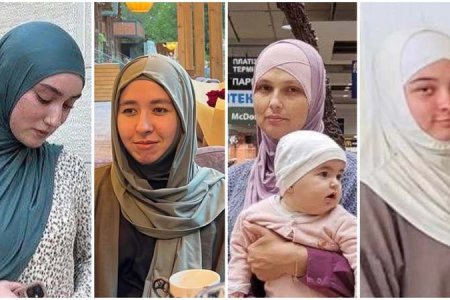
There were, sadly, no surprises on 16 October, with the occupation ‘Kievsky district court’ in Simferopol ordering the detention of Esma Nimetulayeva (b. 1985); Elviza Alieva (b. 2005); Fevziye Osmanova (b. 2004); and Nasiba Saidova (b. 2006). This was despite the fact that none of the four Crimean Tatar women is accused of any recognizable crime and that Esma Nimetulayeva, the wife of a political prisoner, has five young children.
Although there has been a sharp increase in the number of female political prisoners since Russia launched its full-scale invasion of Ukraine, the mass operation on 15 October and its targeting of Crimean Tatar women was a very dangerous red line that Russia crossed for the first time. It is therefore to be hoped that international protest will be forthcoming. Silence back in 2015 when Russia’s FSB first arrested four Crimean Tatar men on fake ‘terrorism’ charges only convinced them that they could act with impunity. Since then, Russia’s so-called ‘Hizb ut-Tahrir’ trials have become a conveyor belt of repression, specifically targeting civic journalists and activists from the Crimean Tatar human rights movement. Men, and now women, are essentially guaranteed sentences of up to 20 years on entirely unproven allegations of ‘involvement’ in Hizb ut-Tahrir, purely on the grounds of a flawed and secretive Russian supreme court ruling from 2003. That declared the peaceful transnational Muslim organization ‘terrorist’ without providing any explanation. The use of such ‘trials’ in occupied Crimea is especially shocking given that Hizb ut-Tahrir is perfectly legal in Ukraine.
Russia has now targeted women, including the wife of a political prisoner, Remzi Nimetullayev. These ‘trials’ have already led to a huge number of Crimean Tatar children traumatized by armed ‘searches’ and forced to grow up without their fathers. The message now is very clearly that they could be totally orphaned with nobody safe from persecution.
The occupation regime was obviously aware that a red line had been crossed, and refrained from direct intervention on Thursday when the relative of the women, as well as other Crimean Tatars, gathered outside the ‘occupation ‘court’ in solidarity with the women. That was by no means guaranteed, with earlier such ‘operations’ having been followed by mass detentions of people simply trying to attend supposedly open ‘court hearings’ or stand outside to demonstrate their support. The ‘hearings’ on Thursday were behind closed doors, despite the lack of any grounds for secrecy.
A delegation of around 70 Crimean Tatars also ignored the danger to themselves and gathered outside the so-called Spiritual Directorate of Muslims of Crimea which under the leadership of mufti Emirali Ablayev chose in 2014 to collaborate with the Russian occupation regime. The delegation demanded that the Directorate “carry out its duty to defend Crimean Tatar women” and react appropriately.
It became clear on 16 October that only Esma Nimetulayeva is facing the more serious charge, of ‘organizing’ a Hizb ut-Tahrir group under Article 205.5 § 1 of Russia’s criminal code. Elviza Alieva; Fevziye Osmanova; and Nasiba Saidova are accused of ‘involvement’ in such a fictitious ‘group’ (Article 205.5 § 2). It remains to be seen whether the same equally absurd charge of ‘planning to violently seize power’, under Article 278, which has become standard in these cases will also be applied here.
The term ‘conveyor belt’ is entirely appropriate for these ‘trials’, with Russia up till now even using the same ‘secret witnesses’ on multiple occasions, as well, of course, as the same FSB-loyal ‘experts’ who can be relied upon to provide the ‘conclusions’ required of them. Although there may prove to be some differences in this case, there were none during the armed searches, with the FSB, as usual planting the ‘prohibited religious literature’ they then claimed, at least in one case, to have found. The tragic certainty is that the women, three of whom are very young, will be convicted and receive long sentences without any crime.
Esma Nimetulayeva (b. 9 January 1986) is a confectioner who had, since August 2023, been the sole parent bringing up her and political prisoner Remzi Nimetulayev’s five daughters, all of whom are under 18.
Elviza Alieva (b. 29 May 2005) is a fourth-year student at the occupation Vernadsky federal university, specializing in management. She has also been working as a sales assistant in a Simferopol bakery.
Fevziye Osmanova (b. 24 May 2004) is from Orlivka, just outside Sevastopol and works in a local shop.
Nasiba Saidova, who was born on 25 October 2026, is the youngest victim of Russia’s Crimean conveyor-belt ‘Hizb ut-Tahrir trials’. She is from Bakhchysarai region and the daughter of a well-known Imam. She herself is studying at a teacher-training college and also works at a nursery.


